|
|
|
Sort Order |
|
|
|
Items / Page
|
|
|
|
|
|
|
| Srl | Item |
| 1 |
ID:
116164
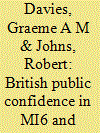

|
|
|
|
|
| Publication |
2012.
|
| Summary/Abstract |
There are considerable concerns about public perceptions of intelligence stemming directly from the highly politicized nature of intelligence estimates in the run-up to the US-UK invasion of Iraq in 2003. In this article we use a new public attitudes dataset to provide the first ever analysis of British public confidence in MI6 and Government use of intelligence. The article demonstrates that the public have relatively high confidence in the intelligence produced by MI6 but are extremely sceptical about how the Government will present that intelligence. Using an ordered logit model this article then examines the factors that influence public perceptions of both intelligence and Government, finding that women are a lot less confident in both the intelligence services and government presentation of intelligence than men, suggesting that this might help explain gender differences in support for military action. The study also demonstrates that party identifiers and Catholics have very low confidence in the intelligence produced by MI6. The study shows that public confidence in both government and intelligence has a strong effect on support for preventive military action against terror camps, suggesting that the intelligence agencies need to avoid being contaminated by political agendas as much as possible if the intelligence case for future military actions is to be supported by the public.
|
|
|
|
|
|
|
|
|
|
|
|
|
|
|
|
| 2 |
ID:
116170
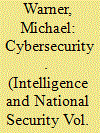

|
|
|
|
|
| Publication |
2012.
|
| Summary/Abstract |
The 'cyber' issue is not new, but rather has taken a half-century to develop. Indeed, it was already decades old before the general public and many senior leaders recognized its salience in the mid-1990s. It developed, moreover, along a logical path, which can be depicted as the successive dawning (for American policymakers, officials, and intelligence officers) of four insights, each of which was glimpsed in theory at least shortly before empirical evidence verified that it was indeed a reality to consider in setting policies, standards, and doctrine. Thus the official responses to the emergence of the cyber issue in the late-1990s were shaped by the outcomes of those earlier debates; the options available to policy-makers in the White House, Congress, the Pentagon, and the various agencies were already conditioned and even determined by previous arguments.
|
|
|
|
|
|
|
|
|
|
|
|
|
|
|
|
| 3 |
ID:
116163
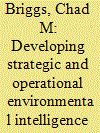

|
|
|
|
|
| Publication |
2012.
|
| Summary/Abstract |
This article examines the role of environmental change in conducting intelligence assessments, and the important role in integrating scientific data with background assumptions behind military and security planning. Tracing the development of environmental security concepts, recent military and intelligence interest in climate and environmental changes are based on practical concerns over critical vulnerabilities of infrastructure, energy supplies, and system stability. Examples from Central Asia illustrate the cascading nature of environmental security risks, particularly with water and energy systems. The discussion follows with how scenarios and risk assessments can be integrated with concepts from environmental net assessments, and why traditional assumptions of probabilities, uncertainties and secrecy may be misleading. It is essential to understand not only how extreme future changes might be, but what capabilities we and allies posses to adapt to environmental-related hazards.
|
|
|
|
|
|
|
|
|
|
|
|
|
|
|
|
| 4 |
ID:
116166


|
|
|
|
|
| Publication |
2012.
|
| Summary/Abstract |
Secret intelligence became a major ingredient in international relations in the twentieth century, vital as much to peace as to war. Cooperation was an ingredient in intelligence success, with the British-American special relationship the century's prime and dominant example. The US-UK arrangement reached a Churchillian apogee in the 1940s and 1950s, then in the 1960s there were signs of change. Upheavals within American society, new challenges to US foreign policy, a decline in British capabilities and the end of the Cold War did not destroy the Anglo-American intelligence relationship, but they did undermine its exclusive character.
|
|
|
|
|
|
|
|
|
|
|
|
|
|
|
|
| 5 |
ID:
116162
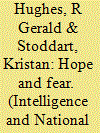

|
|
|
|
|
| Publication |
2012.
|
| Summary/Abstract |
This article explores a number of debates that have dominated intelligence studies since the terrorist attacks of 11 September 2001. It examines a number of inherent tensions, involving individuals and institutions, which threaten the long-term compatibility of the national security state with liberal democracy. The notion as to whether or not the use of extreme coercive measures (such as torture) can ever be justified is examined, as is the question as to whether such measures are self-defeating. The piece examines how liberal democracies seek to protect themselves in the light of rapid changes via a globalised media, the Information Revolution, and the proliferation of advanced technology and weapons of mass destruction amongst state and non-state actors. These issues are discussed with particular reference to the use of intelligence in Afghanistan, Iraq, Iran, North Korea and other global trouble spots. Finally, the article speculates on the future of the increasingly enmeshed relationship between policy-makers, intelligence agencies and the media. It is concluded that, without a clear agenda for the modification of the mechanisms for accountability and oversight, this triangular relationship will, despite its interdependence, be fraught with increasing difficulties.
|
|
|
|
|
|
|
|
|
|
|
|
|
|
|
|
| 6 |
ID:
116169


|
|
|
|
|
| Publication |
2012.
|
| Summary/Abstract |
The post-9/11 period and its emphasis on tackling terrorism has had a fundamental impact on the business of intelligence, not least in raising some very difficult ethical issues to the forefront of debate. Many of these issues are intertwined with the business of 'policing globalisation' in the modern era. The changes and developments offer new opportunities in Intelligence Studies for exploring ethics, and the role of the intelligence function within a modern liberal democracy. The questions posed by the new threat picture for such states offer something of an 'intelligence dilemma', which must balance the provision of good security with respecting civil liberties and ensuring the continued support of the population for security and intelligence policy. This article examines the intelligence dilemma within the framework of five dimensions: globalisation, risk and resilience; the question of a 'surveillance society'; the 'intermestic' challenge in the new threat picture; difficulties around the use of covert action and cyber capabilities; and partnership risks. The article suggests that a deeper analysis of these issues represents opportunities for taking Intelligence Studies in new directions.
|
|
|
|
|
|
|
|
|
|
|
|
|
|
|
|
| 7 |
ID:
116167


|
|
|
|
|
| Publication |
2012.
|
| Summary/Abstract |
The UK government has accepted the case for strengthening the oversight of the security and intelligence agencies in its 2011 Green Paper on Justice and Security and in the draft Justice and Security Bill 2012. While welcome these proposals are, however, seriously deficient in neglecting the potential contribution of oversight to the protection of human rights. This article argues that democratic oversight should play a significant role in strengthening the protection of human rights by way of audit of policies and review of operations of the agencies, with regard to international intelligence cooperation and where the storage and use of personal data by the services is concerned.
|
|
|
|
|
|
|
|
|
|
|
|
|
|
|
|
| 8 |
ID:
116165
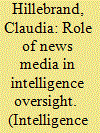

|
|
|
|
|
| Publication |
2012.
|
| Summary/Abstract |
This article explores the role of the news media in overseeing intelligence services and their work. As an informal mechanism, how do they fit into the wider landscape of intelligence oversight? By drawing on examples of US counter-terrorism efforts in the post-9/11 era, the article identifies three roles for the news media in intelligence oversight: as an information transmitter and stimulator for formal scrutinizers, as a substitute watchdog and as a legitimizing institution. Yet there is a danger of the news media acting merely as a lapdog. Other limitations include the impact of regulatory frameworks, government secrecy and the media strategies of intelligence services. The article concludes that the news media play an important role in the wider intelligence oversight landscape, but that their ability to scrutinize is uneven and ad hoc and as a result the picture they produce is blurred.
|
|
|
|
|
|
|
|
|
|
|
|
|
|
|
|
| 9 |
ID:
116168
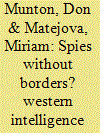

|
|
|
|
|
| Publication |
2012.
|
| Summary/Abstract |
Iran's Islamic Revolution and the takeover of the United States embassy in Tehran in November 1979 was America's and the West's first encounter with contemporary radical Islam. It prompted substantial intelligence cooperation amongst Western countries. Their liaison included not only the collection of human intelligence (Humint) but also an effort to protect six Americans who had escaped becoming hostages, and then a successful covert exfiltration operation to secure their escape from Iran. Canadian embassy staff, assisted by CIA experts, mounted this operation in late January 1980. We use the Iranian Revolution and occupation of the American embassy in Tehran both to flesh out the nature of contemporary Western Humint cooperation and to highlight the intelligence activities, including international intelligence liaison, of Western foreign ministries.
|
|
|
|
|
|
|
|
|
|
|
|
|
|
|
|
|
|
|
|
|